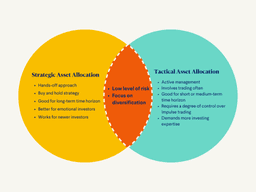Strategic Asset Allocation
Strategic Asset Allocation (SAA) is an investment strategy based on Modern Portfolio Theory. Using this strategy, investors set target allocations for different asset classes and periodically rebalance their investment portfolios to maintain them. Based on individual risk tolerance, investment objectives, and time horizon, investors determine what percentage of their portfolio should be invested in each asset class. Common portfolio allocation approaches often consist of stocks and bonds, though many investors may deviate from this to include alternative assets, such as real estate (diversification is key, after all).
While this is a primarily hands-off method of investing, rebalancing is critical to taking advantage of it. For example, say an investor allocates $100,00 50/50 to stocks and bonds. After 1 year, his stocks have generated 10% return, while bonds have generated only 5%. That investor’s portfolio is no longer balanced at 50/50 as his target allocation suggested, but is rather leaning toward the stock market. In order to rebalance his asset mix, the investor would sell stocks to reinvest in bonds.
Requiring only upfront research and periodic rebalancing (often annual), strategic allocation is a relatively passive method. This is helpful for investors with limited experience and long investment horizons, those who would otherwise invest impulsively or panic sell, and investors who want to buy and hold rather than frequently moving money around or tracking the market. This follows the idea in Modern Portfolio Theory that the market will follow patterns over time with built-in efficiency, making it more reliable to buy-and-hold than to emotionally bet on short-term trends. For inexperienced investors, this form of portfolio management alleviates concerns of volatility and limits the number of investment decisions once they identify their investment goals.
For more information on Strategic Asset Allocation and how it relates to real estate investment opportunities, please see this article.
Strategic vs Tactical Asset Allocation
Tactical Asset Allocation (TAA) is another strategy based on Modern Portfolio Theory suitable for more active investors. As opposed to SAA, TAA involves active management—i.e., regularly adjusting portfolio weightings based on short or medium-term expectations for economic conditions, valuations, or market cycles. Using TAA, investors can adapt to the market with the goal of generating higher expected returns.
Download the whitepaper to learn about optimizing your retirement portfolio through modern real estate investing.

